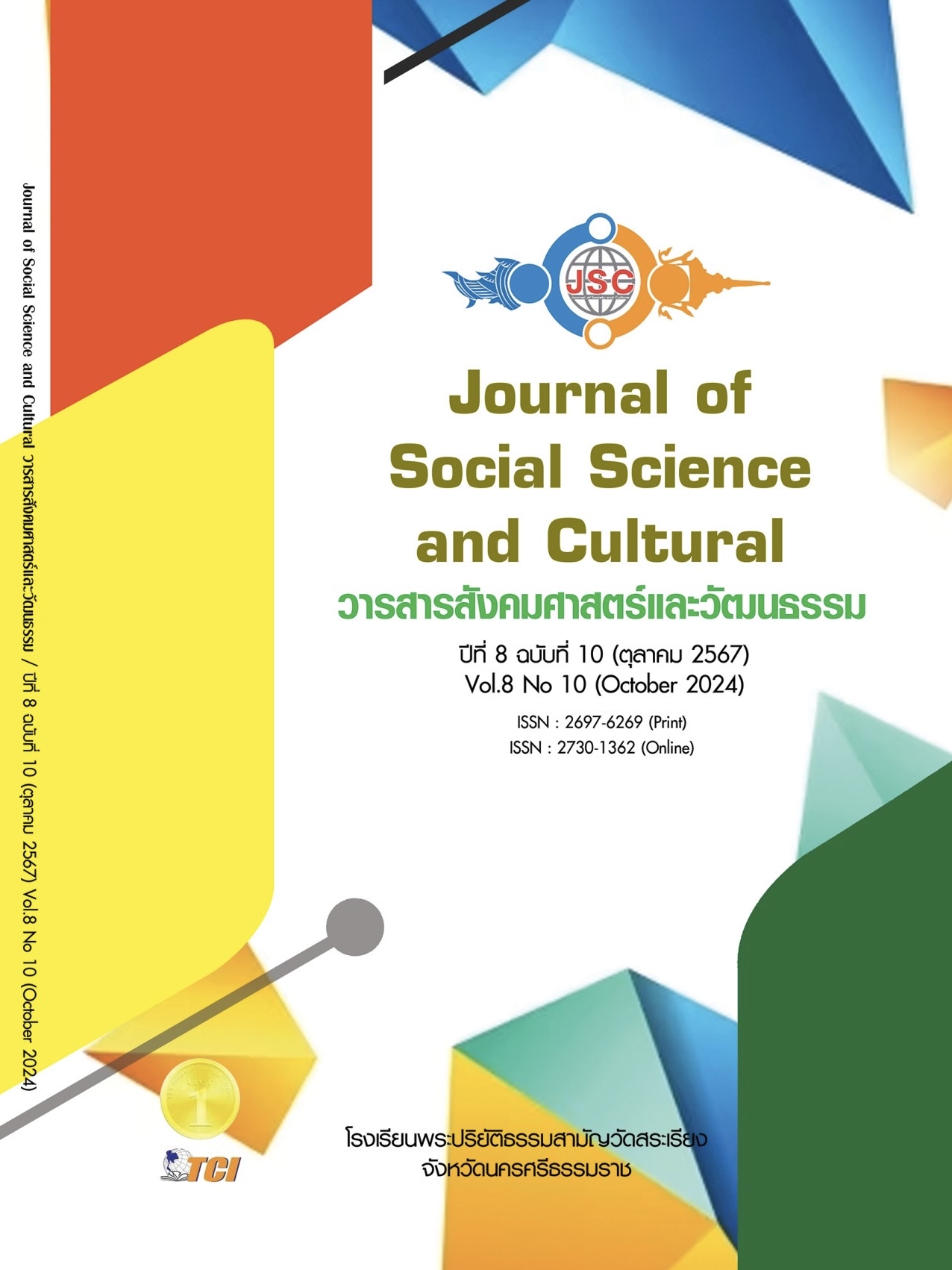A DEVELOPMENT 21ST CENTURY LEADERSHIP OF COMMITTEE ASSOCIATION OF FUTURE THAI PROFESSIONALSURIN TECHNICAL COLLEGE
Main Article Content
Abstract
This research aimed to 1) Study the level of leadership in the 21st century and the need for development, 2) Study the level of knowledge, skills, and attitudes regarding the operation of the Association of Future Thai Professionals, 3) Study the outcomes of 21st century leadership development using the Participatory Action Research Cycle, and 4) to examine the effectiveness of the 21st century leadership development program of the Executive Committee of the Association of Future Thai Professional, Surin Technical College. Four stakeholder groups were selected through specific selection methods: 1) Researchers, 2) Co-researchers, 3) People from target groups, and 4) Key informants. The research used a Participatory Action Research (PAR) model with 4 steps and 2 cycles. The research results found that 1) The overall level of leadership in the 21st century was at a moderate level ( = 3.07), with a value of necessary needs (PNI modified) = 0.47. 2) The overall level of knowledge, skills, and attitudes before development was at a low level (
= 2.36). 3) The results of development according to the participatory action research cycle from the implementation of the 2st Century Leadership Development Project passed the standard criteria for all activities, which is consistent with the consistency index or reliability value of 0.96 and 4) The effectiveness of leadership development in the 21st century includes: 1) The overall progress after development is at a high level (
= 4.40) at 77.17 percent. and 2) The overall satisfaction is at the highest level (
= 4.77) when the statistical test is compared with the specified criteria at a significant level of .01.
Article Details
References
งานประกันคุณภาพและมาตรฐานการศึกษา. (2565). รายงานการประเมินตนเอง (SAR) ปีการศึกษา 2564. สุรินทร์: วิทยาลัยเทคนิคสุรินทร์.
จีระ หงส์ลดารมภ์. (2558). แนวคิดของการพัฒนาภาวะผู้นำจาก 2 ช่วงเวลา. วารสาร HR intelligence, 10(2), 81-93.
ชูศรี วงศ์รัตนะ. (2546). เทคนิคการใช้สถิติเพื่อการวิจัย. นนทบุรี. (พิมพ์ครั้งที่ 9). กรุงเทพมหานคร: มหาวิทยาลัยศรีนครินทร์วิโรฒประสานมิตร.
ดุษฎีรัตน์ โกสุมภ์ศิริ. (2558). นำภาวะผู้แบบดุลยภาพ - ภาวะผู้นำสำหรับศตวรรษที่ 21. เรียกใช้เมื่อ 24 พฤษภาคม 2566 จาก http://leader1234.blogspot.com/2015/09/21-scholarly-article-equilibrium.html
ธนกฤต โชติภักดีโภคิน. (2565). รูปแบบการพัฒนาภาวะผู้นำของคณะกรรมการองค์การนักวิชาชีพในอนาคตแห่งประเทศไทยในศตวรรษที่21 อาชีวศึกษาภาคตะวันออกเฉียงเหนือ. สิกขาวารสารศึกษาศาสตร์, 9(2), 63-75.
นพดล บุญภา. (2562). การพัฒนาภาวะผู้นำในศตวรรษที่ 21 สำหรับผู้นำนักเรียนระดับมัธยมศึกษา. ใน ดุษฏีนิพนธ์ปรัชญาดุษฏีบัณฑิต สาขาผู้นำการศึกษาและการพัฒนาทรัพยากรมนุษย์. มหาวิทยาลัยราชภัฎเชียงใหม่.
นุชวนา เหลืองอังกูล. (ม.ป.ป.). ความเชื่อมั่นของเครื่องมือวัดผลที่ใช้ในการวิจัย. เรียกใช้เมื่อ 30 ตุลาคม 2566 จาก https://so02.tcithaijo.org/index.php/jemmsu/article/download/148942/109449
บุญชม ศรีสะอาด. (2545). วิธีการทางสถิติสำหรับการวิจัย. (พิมพ์ครั้งที่ 2). กรุงเทพมหานคร: สุวีระยาสาสน์.
ปฏิมา นรภัทรพิมล. (2561). การพัฒนาภาวะผู้นำของคณะกรรมการสภานักเรียนระดับมัธยมศึกษา กรณีโรงเรียนประชารัฐธรรมคุณสังกัดสำนักงานเขตพื้นทีการศึกษา. วารสารมนุษยศาสตร์และสังคมศาสตร์มหาวิทยาลัยราชภัฏอุบลราชธานี, 9(1), 306-319.
พิชิต ฤทธิ์จรูญ. (2549). ระเบียบวิธีการวิจัยทางสังคมศาสตร์. กรุงเทพมหานคร: เฮาส์ออฟเคอร์มีสท์.
ไพฑูรย์ สินลารัตน์. (2557). ครูในศตวรรษที่ 21. เอกสารประชุมวิชาการ “อภิวัฒน์การเรียนรู้สู่จุดเปลี่ยนประเทศไทย”. กรุงเทพมหานคร: สำนักงานส่งเสริมสังคมแห่งการเรียนรู้และพัฒนาคุณภาพเยาวชน (สสค.).
วิจารณ์ พานิช. (2555). วิธีการสร้างการเรียนรู้เพื่อศิษย์. กรุงเทพมหานคร: มูลนิธิสดศรีสฤษดิ์วงศ์.
วีรวัฒน์ คำแสนพันธ์. (2566). รูปแบบการพัฒนาภาวะผู้นำของคณะกรรมการองค์ การนักศึกษา มหาวิทยาลัยราชภัฏภาคตะวันออกเฉียงเหนือ. ใน ดุษฏีนิพนธ์ปรัชญาดุษฏีบัณฑิต สาขาวิชาการบริหารการศึกษา. มหาวิทยาลัยราชภัฏสกลนคร.
สมนึก ภัททิยธนี. (2551). การวัดผลการศึกษา. (พิมพ์ครั้งที่ 6). กรุงเทพมหานคร: ประสานการพิมพ์.
สำนักงานเลขานุการของคณะกรรมการยุทธศาสตร์ชาติ. (2560). ยุทธศาสตร์ชาติ พ.ศ. 2561 - 2580. (ฉบับย่อ). กรุงเทพมหานคร: สำนักงานคณะกรรมการพัฒนาเศรษฐกิจและสังคมแห่งชาติ.
สุวิมล ว่องวาณิช. (2558). การวิจัยประเมินความต้องการจำเป็น. (พิมพ์ครั้งที่ 3). กรุงเทพมหานคร: วี.พริ้นท์.
องค์การนักวิชาชีพในอนาคตแห่งประเทศไทย. (2560). ระเบียบสำนักงานคณะกรรมการการอาชีวศึกษาว่าด้วยองค์การนัก วิชาชีพในอนาคตแห่งประเทศไทย พ.ศ. 2557 (ปรับปรุง พ.ศ. 2560). กรุงเทพมหานคร: สำนักงานคณะกรรมการการอาชีวศึกษา.
Brin, D. (1998). Leadership Research Findings Practice and Skill. Houghton: Miffin Company.
Canton, J. (2006). The Extreme Future: The top trends that will reshape the world in thenext 20 years. United States of America: Penguin group.
Crain-Gully Sr, D. I. (2003). Exploring transformational leadership characteristics among African American church leaders in the San Francisco Bay area. In Doctor of Management in Organizational Leadership. University of Phoenix.
James, E. A. al et. (2008). Participatory action research for educational leadership. California: Sage.
Lautzenheiser, T. (2009). The selection and development of effective student leaders. Retrieved 10 July, 2023, from http://musicforall.org/programs/gn/downloads/.selection.pdf
Trilling, B. & Fadel, C. (2009). Learning and innovation skills: 21st century skills learning for life in our times. San Francisco: Jossey-Bass.
Trulove, S. (1992). Handbook of training and development. Oxford: Blackwell.


